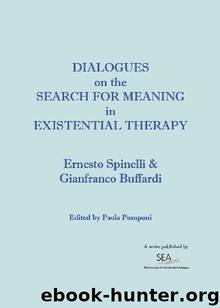Dialogues on the search for meaning in Existential Therapy (SEA Dialogues Book 1) by Ernesto Spinelli & Gianfranco Buffardi

Author:Ernesto Spinelli & Gianfranco Buffardi [Spinelli, Ernesto]
Language: eng
Format: epub
Tags: psychotherapy, philosophy
Publisher: Society for Existential Analysis
Published: 2019-05-24T15:00:00+00:00
DIALOGUE 8
Gianfranco Buffardi
We are being philosophical, it is true, but I don’t think we are overdoing it. When my students ask me how important is philosophy in everyday life, I tell them that we think philosophically even when are cooking a fried egg, only we are not aware of it.
I totally agree with your considerations; quantum physics tell us that there are quanta of energy that are also matter, waves and bodies. They exist even when they are absent, indivisibly joined even if at an unbridgeable distance. If physics recognizes the coexistence of figure/ground and in that it observes the absence of a hierarchy, meaning that nothing determines the figure as more important than the ground, how could we possibly imagine that the real world could contradict this basic assumption?
I agree when you say “to be conscious of my individuality… there must be a pre-existing (or, at the very least, a co-existing) condition that permits my individuality to stand out in contrast to it” . A pre-existence or rather a co-existence of the “ground” that allows me to recognize my singularity is the basis of the process of identification. I, as a unique individual, co-exist with my own world and that of the other, but I also co-exist with my non-existing. My presence co-exists with my absence. I could not imagine a presence, without having earlier imagined an absence. My being here-and-now co-exists with an here-and-now different from my being here, etc.1 The famous fundamental question, as to why there should be something rather than nothing, should be accompanied by the question of whether we could ever have the concept of something, unless we had the concept of nothing? Perhaps we should pose the question also related to our existential (or better, existent) experience; would it be possible for us to perceive our existence without having the concept of non-existence?
It all seems so far removed from our daily experience (and, especially, from that of our patients), but the principle that often determines the individual’s difficulty in confronting others, is similar; I can recognize or not recognize qualities or abilities in me that are or are not there also in other people, only if I have the awareness of the presence of these qualities. There are many experiential facts that need this confrontation. I will try to exemplify some of the dichotomies that are frequently found in psychotherapeutic dialogues:
• Normal/pathological
• Appropriate/inappropriate
• Coherent/incoherent
• Loved/unloved
• Welcome/unwelcome
• Better than others/worse than others.
You mentioned gestalt. The gestalt system is such that allows us to identify boundaries, so that we can decide on which part of the boundary we want to focus our attention. The boundary as such is the basis of the identification process, therefore our dialogues return to an issue already mentioned by me in reply to you contributions to the dialogue, which I feel is crucial for a consideration of existential work; the issue of identity is unavoidable either in a general discussion, and in our particular dialogue in practicing psychotherapy.
While I would
Download
This site does not store any files on its server. We only index and link to content provided by other sites. Please contact the content providers to delete copyright contents if any and email us, we'll remove relevant links or contents immediately.
Get the Life You Want by Richard Bandler(1078)
Doing Psychotherapy by Robin Shapiro(786)
Understanding Sleep and Dreaming by William H. Moorcroft(782)
Cognitive Behavioural Therapy For Dummies by Rob Willson & Rob Willson(696)
104 Activities That Build: Self-Esteem, Teamwork, Communication, Anger Management, Self-Discovery, Coping Skills by Alanna Jones(693)
True Refuge: Finding Peace and Freedom in Your Own Awakened Heart by Tara Brach(678)
Archetypal Patterns in Fairy Tales by Marie-Louise von Franz(630)
The Light That Failed by Stephen Holmes(623)
The Light that Failed by Ivan Krastev(623)
An Introductory Dictionary of Lacanian Psychoanalysis by Evans Dylan(615)
Handbook of Adolescent Behavioral Problems by Thomas P. Gullotta Robert W. Plant & Melanie A. Evans(608)
P by Unknown(605)
Change by Kottler Jeffrey A(602)
A Primer for Beginning Psychotherapy by William N. Goldstein(592)
Raising Self-Esteem in Adults by Susan Buchalter(578)
Self-Therapy, Vol. 3: A Step-by-Step Guide to Using IFS for Eating Issues, Procrastination, the Inner Critic, Depression, Perfectionism, Anger, Communication, and More (Self-Therapy Series) by Jay Earley(558)
Change Your Thinking [Third Edition] by Sarah Edelman(556)
2 by Slings & Arrows(553)
Zen and Psychotherapy by Joseph Bobrow(532)
